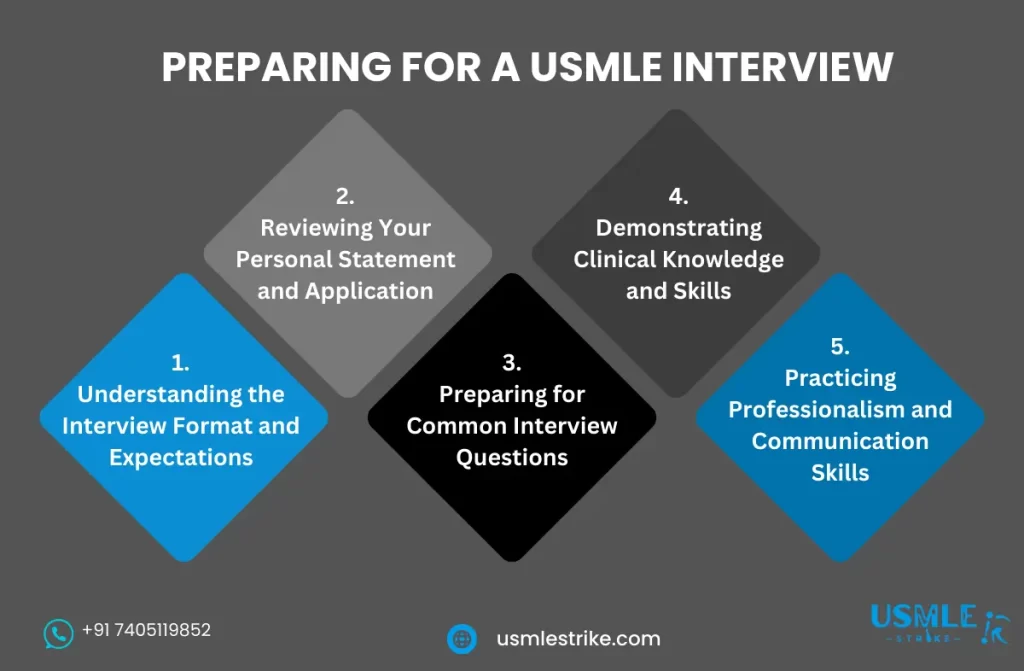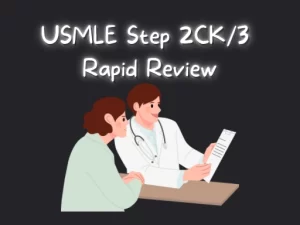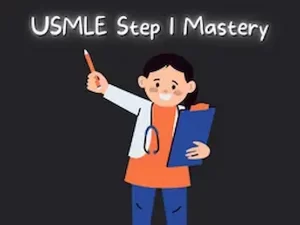The United States Medical Licensing Examination (USMLE) is a critical step for physicians who are seeking to practice medicine in the United States. The USMLE consists of three steps, and the third step includes an interview with residency programs. So, you will have to put in a lot of effort for the USMLE interview preparation.
How to Prepare Early for the USMLE Interview?
Preparing for the United States Medical Licensing Examination (USMLE) interview involves reviewing common USMLE interview questions and following a structured approach to ensure you are confident and ready for each stage of the process.
1. Familiarize yourself with the interview format.
2. Research the program you’re applying to.
3. Practice commonly asked USMLE interview questions.
4. Prepare responses that highlight your strengths, accomplishments, and experiences.
5. Dress in professional attire, whether it’s a virtual or in-person interview.
6. Listen carefully to the questions asked in the interview and respond thoughtfully.
7. Be confident in your abilities and authentic in your responses.
After the interview, seek feedback from mentors, friends, or colleagues to identify areas for improvement.
General Questions
A. Tell me about yourself:
1. Tell me about yourself. How would your friends describe you?
2. Tell me about something interesting about you that wasn’t included in your CV
B. Medicine and the specialty:
3. What got you interested in medicine?
4. If you had to change one thing about the specialty you are applying to, what would that be?
C. Your strengths:
5. What makes you stand out from the rest of the candidates?
6. Why should we choose you instead of other applicants?
D. Your weaknesses:
7. What things would you like to change about yourself?
8. What are your weaknesses?
E. Future goals:
9. What do you want to do after you finish residency?
10. Who is your idol in life?
Questions About Your Research Background
- Can you walk me through the main area of your research?
- What specific role or responsibilities did you have in your project?
- What motivated you to choose this research topic or program?
- How does your research tie into your long-term specialty goals?
- What do you think is the broader impact of your research work?
Questions About U.S. Clinical Experience (USCE)
- During your observership, externship, or elective, what tasks were you involved in?
- What valuable skills or insights did you take away from your USCE?
- Why did you decide on that particular program or hospital for your clinical training?
- Can you share a meaningful patient or learning experience from your USCE?
- In what ways do you believe your U.S. clinical exposure will prepare you for residency?
Professional & Ethical Scenario Questions
- If you could bring about one change in the U.S. healthcare system, what would it be and why?
- Which type of patients do you find most challenging to work with, and how do you handle such situations?
- Suppose you encountered a colleague or attending who was unfit for duty—how would you manage the situation?
- If asked to describe yourself in one word, what would it be?
- Before we wrap up, what questions would you like to ask about our program?
Benefits of Our USMLE Interview Preparation Guide
Preparing for your USMLE interview in advance can significantly enhance your chances of success, boosting your confidence and improving your ability to present yourself effectively. At USMLE Strike, founded by the dynamic Dr. Apurva Popat, we focus on providing comprehensive interview preparation to equip you with the tools to ace your interview and secure your spot in your preferred residency program.
Here are some of the benefits of USMLE interview preparation:
Improved Confidence
When you prepare thoroughly with the guidance of USMLE Strike, you’ll feel more confident in your abilities. Understanding what to expect, practicing how to answer questions about your background, experience, and goals, will help you feel less nervous and more in control during the interview. This leads to a smoother and more successful interview experience.
This preparation can help you feel less nervous and more in control, which can lead to a better overall interview experience.
Enhanced Interview Skills
Preparing early for your USMLE interview can also help you develop strong interview skills. By practicing your responses to these questions, you can develop clear and concise answers that effectively communicate your strengths and abilities.
Additionally, you can work on your non-verbal communication during your USMLE interview preparation, such as eye contact, posture, and tone of voice, to create a more positive impression.
Better Time Management
Time management is key to success in the USMLE and residency interviews. With Dr. Apurva Popat’s expertise, we’ll help you organize your preparation into manageable steps, such as scheduling mock interviews, researching programs, and refining your responses. This structured approach to interview preparation reduces stress, prevents last-minute cramming, and boosts overall performance.
The Importance of Time Management
Achieving success in both the USMLE and residency interviews is akin to unlocking a magic formula – and that secret lies in mastering the art of time management. These milestones are pivotal in your medical journey, and facing them concurrently might feel daunting. To navigate this challenge, consider time as a valuable currency. Just as you wouldn’t squander money, it’s essential not to waste time. Strategic time management is crucial not only for your USMLE study but also for effective USMLE interview preparation. Let’s explore some strategic time management approaches to conquer these significant hurdles.
Increased Familiarity with the Program
Researching the residency program in advance can help you understand their values, goals, and expectations. This information can be used to tailor your responses and highlight how your skills and experience align with the program’s needs.
Additionally, by familiarizing yourself with the USMLE interview preparation by knowing the program’s structure and culture, you can better determine if it’s a good fit for your own goals and career aspirations.
Greater Clarity in Communication
When you have a clear understanding of your own career goals and how they align with the program, you can communicate this more effectively to the interviewer. This can aid the interviewer see how you can contribute to the program and how the program can help you achieve your own career goals.
Additionally, clarity in your communication makes it less likely that you will become flustered or nervous, allowing you to present yourself in a more positive light. Proper USMLE interview preparation ensures that you can convey your goals confidently and professionally during the interview.
Increased Chances of Matching
Ultimately, our goal at USMLE Strike is to help you secure a residency program that aligns with your aspirations. Thorough preparation with our guide, led by Dr. Apurva Popat, increases your chances of matching with your preferred program. We ensure you’re fully equipped to stand out among other applicants.
Prepare for your USMLE interview with USMLE Strike and the expert guidance of Dr. Apurva Popat to unlock your potential and achieve your residency goals. Visit Dr. Apurva Popat’s profile for more insights and resources to support your journey.

Strategies for Effective Time Management
- Set Attainable Goals: Recognize that excelling in the USMLE and residency interviews demands distinct skill sets and preparation. Define realistic and achievable objectives for each to guide your focused efforts.
- Craft a Thoughtful Study Schedule: Devise a well-structured study schedule that dedicates specific time slots to USMLE preparation and interview readiness. Committing to this schedule consistently is key to staying on track and making progress.
- Embrace Mindfulness: Harness the power of mindfulness by being fully present in each activity. Maximize your productivity by immersing yourself completely in the task at hand. Avoid the pitfalls of multitasking and focus on one task at a time, which helps improve the quality of your USMLE interview preparation and overall study outcomes.
Conclusion
Early USMLE interview preparation can provide several benefits but you have to take your time to research the program, practice your responses, and develop a clear understanding of your own career goals as all these can elevate your prospects of success and enable you to accomplish your aspirations in the medical field.
Read Also: Residency Program Requirements





